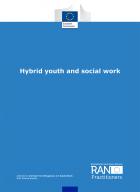Details
- Publication date
- 16 February 2022
- Author
- Directorate-General for Migration and Home Affairs
- RAN Publications Topic
- Vulnerable youth and youth engagement in P/CVE
Description
Online social systems, which are interwoven throughout the digitally savvy lives of children and young people, are not only spaces for games and memes. They are also arenas of social interaction and belonging. Before streaming and gaming, monitoring at-risk youth involved screening their physical environment.
Today, it is just as important to assess their browser history and learn about their preferred hashtags. It is within this context that the paper seeks to demystify the new online arenas of potential radicalisation and their attraction to certain groups of young people.
The paper will also shed light on the psychological and sociological perspective of the young people who are seeking them out. The overall aim of the paper is to enable youth and social workers, teachers, parents, and caregivers to become empowered actors in the increasingly digital lives of children and young people.
Challenges
Many young people facing challenging or risky social situations in their day-to-day life seek support in online settings. This makes them vulnerable to risks, which are oftentimes not directly visible to professionals focusing on the local physical community.
Furthermore, many experienced professionals have been educated and are experienced and comfortable working in a physical space. They may feel they lack the appropriate tools or insights to engage with young people in the digitalised world. Many professionals and parents feel an obligation to minimise time spent online or in front of screens. This is something that many young people report as the sole focus of conversations on digital environments adults engage them in (how long they are used rather than what they are used for).
This hinders constructive discussions about communities, impressions and emotions that are created in the digital context. The COVID-19 pandemic and subsequent lockdowns and stay-at-home mandates resulted in an increase in screen time. The restrictions also necessitated a digitalisation of many professions, including pedagogical and psychological interventions.
As a result, a hybrid-approach was required for a range of new and existing projects. What’s more, considering that most professionals and parents did not themselves experience the ubiquitous social media (SoMe) environment as teenagers, it is not easy for them to fully understand the almost cyborg-like nature of the new generation of adolescents who do not go online but rather are online as a prerequisite to (social) life.
Previous RAN papers have dealt extensively with many practical questions regarding how to conduct digital youth work. This paper builds on the excellent points made herein, and furthers the understanding of the ever-expanding and evolving digital landscape of children and young people.

